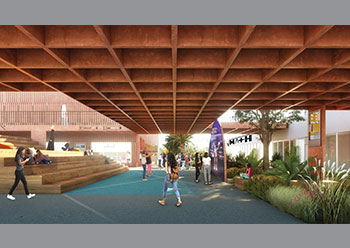Future Schools on WAN Awards shortlist
01 September 2020
The Public Authority for Housing Welfare (PAHW) has announced that the design of the “Future Schools of Kuwait” project has been shortlisted for the World Architecture News (WAN) Awards 2020.
Designed by Pace, one of the region’s leading architecture and engineering practices based in Kuwait, the innovative project is vying for top global honours under the Future Projects – Education Category.
This is the project’s second international accolade, recognising its progressive and adaptive design approach. It had previously won the American Institute of Architects (AIA) Merit Award in the ‘Architecture Unbuilt’ category. The AIA jury recognised the project at the annual AIA – Middle East Conference and Design Awards 2019.
As part of its efforts to improve the standards of education in Kuwait, the PAHW had collaborated with Pace to embark upon a programme to radically redesign schools within the country, to offer more student-centred, technological and experiential forms of learning.
 |
|
The prototype design model is set to be replicated and developed for schools across Kuwait. |
The prototype design model is set to be replicated and developed for schools across the country, in an effort to address the needs of a new generation of students.
On the key achievement, Deputy General Manager for Planning and Design Sector at PAHW Nasser Khraibut says: “We are very pleased to have won yet another prestigious global award for this promising future project in collaboration with Pace.”
Known across the region as a partner of national development for decades, Pace had delivered initial prototypes to develop primary and middle government schools.
On the shortlisting, Pace CEO Tarek Shuaib says: “We are excited to witness our unbuilt future design garnering international recognition for its innovative approach. We’re confident enough to say that the project succeeded in critically examining the outdated platforms found in a region desperate for change in the educational model, which are in need of an open and creative educational adaptation.”
Khraibut says PAHW’s vision was to design a school for the next generation, Generation Alpha, that will live through the next 50 years and transition Kuwait from an outdated schooling model into the future of education – with experiential learning being a big part of it.
On the design, Shuaib says Pace’s award-winning concept designs for the schools break down the boundaries of conventional learning by extending the functionality of the building to spaces such as corridors, staircases or outdoor areas, with more flexibility to house multiple activities.
“The highly-functional designs ensure that they respond to the site and programme, as well as being adaptable, sustainable and inclusive of future change,” he explains.
Elaborating further, Khraibut says the design is centred on creating open and transparent spaces to foster a safe and secure environment, eliminating “dead areas” that are more concealed from sight.
“This reduces opportunities for bullying and helps create a more controlled environment where students feel safe to learn and explore. The designs are also led by their belief in creating completely accessible spaces that are inclusive of people of all different capabilities,” he adds.
In terms of sustainability within the buildings, Shuaib points out that it has been achieved in the design primarily through passive cooling methods such as shading and the extensive use of vegetation, which also creates a pleasant environment for kids to play. It will surely encourage them to explore their outdoors while being friendly to the environment.”
“Our design aims to reduce temperature-controlled spaces and maximise outdoor covered areas in order to reduce load. In addition to cooling techniques, sustainability is also used as a learning tool,” remarks Shuaib.
“The future generations can be taught to be more conscious of their environment by providing space for outdoor classes, planting gardens and other green areas,” he adds.
- Ecological wonders
- Abu Dhabi mosque wins global recognition
- Mirroring the desert
- Future Schools on WAN Awards shortlist
- GA Architects’ hotel project wins accolades



